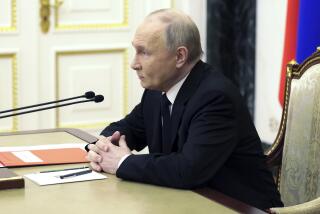Yeltsin OKs Negotiation of Treaties With Baltics
- Share via
MOSCOW — Boris N. Yeltsin, the reformist president of the Russian Federation, agreed Friday to negotiate treaties with the three Baltic republics, bypassing the Soviet government’s central authority, Baltic officials said.
In the republic of Byelorussia, the parliament declared that its laws take precedence over Soviet law and that Byelorussia has the right to its own armed forces, the official Tass news agency said.
The developments came as setbacks to Soviet President Mikhail S. Gorbachev’s plans to glue together his country’s 15 republics in a new confederation.
Byelorussia is considered to be among the least reform-minded republics, but it followed Russia, the Ukraine and the Baltic republics in declaring its sovereignty.
While the Byelorussian parliament was approving its declaration of sovereignty, the presidents of the Baltic republics of Lithuania, Latvia and Estonia met in Jurmala, Latvia, with Yeltsin, a spokesman said.
“Negotiations between the three Baltic states and Russia must start immediately,” the Estonian News Service said in a report on a statement issued by the presidents.
“After the talks, treaties will be signed between each Baltic state and Russia on political, legal, economic, scientific and technical, and cultural aspects of mutual relations, on relations between nationalities and citizenship.”
The treaties should be ready in six to eight weeks, it said.
Latvian sources, who spoke on condition of anonymity, said recognition of the Baltic republics’ independence by the Russian republic likely would be contained in the treaties, but it would not take effect until the agreements are completed.
Signing of formal agreements between Russia and the independence-minded Baltic republics would be a strong blow by reformers to Gorbachev’s efforts to draft a new agreement binding the Soviet republics together. The Baltic republics do not want to participate in negotiations on the new agreement because they have declared their intention to be independent countries.
A Russian-Baltic accord would signal a serious challenge by Yeltsin to Gorbachev’s leadership. It could lead to other direct agreements among republics that would exclude the Soviet government and circumvent central authority.
Members of Latvia’s parliament quoted Yeltsin as saying in a meeting with Latvian officials on Thursday that “Latvian independence definitely must be recognized in the first, political section of our treaty.”
A Latvian delegation was expected to go to Moscow on Monday to begin talks with Yeltsin’s Russian government.
Presidents Anatoly Gorbunov of Latvia, Vytautas Landsbergis of Lithuania and Arnold Ruutel of Estonia also met Friday to discuss their approach to the negotiations on the new agreement binding the Soviet republics. But no statement emerged.
More to Read
Sign up for Essential California
The most important California stories and recommendations in your inbox every morning.
You may occasionally receive promotional content from the Los Angeles Times.










